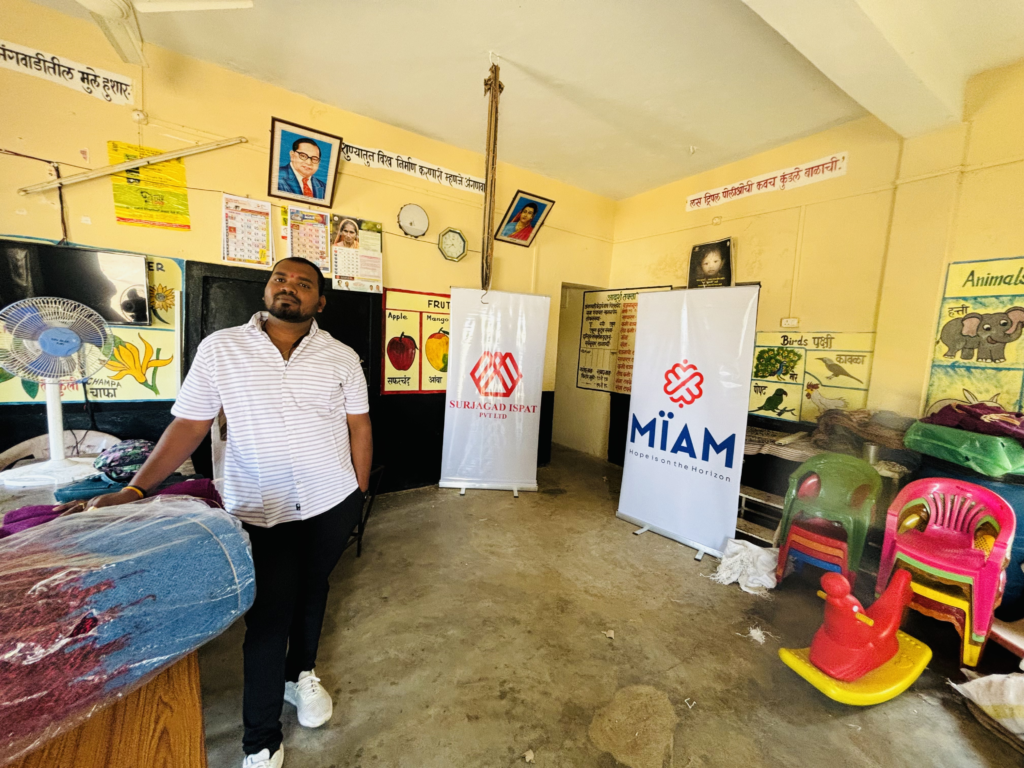- nitu@miamcharitabletrust.com
- Mumbai, India
- nitu@miamcharitabletrust.com
- Mumbai, India

Empowering Tribal Education & Creating Comfort: Donating Floor Mats for Tribal Anganwadi Students
Introduction
Education is the cornerstone of empowerment, yet many underserved communities, particularly tribal populations, face significant barriers to accessing quality education. In the small district of Maharashtra, Nitu Joshi, through her commendable initiative with the Miam Charitable Trust, is striving to change this narrative. This article delves into the transformative impact of donating floor mats to tribal students attending Anganwadi, championing a more welcoming environment for education.
Background of the Initiative
Situated in a remote corner of Maharashtra, the district grapples with multifaceted challenges, including limited resources and infrastructure, hindering educational opportunities for tribal children. Anganwadi centers play a pivotal role in bridging this gap, serving as primary educational hubs for young learners.
The Donation of Floor Mats
Nitu Joshi’s decision to donate floor mats stems from a profound understanding of the importance of conducive learning environments. Beyond providing a comfortable space for students to sit and engage, these mats symbolize a tangible commitment to nurturing a positive atmosphere for learning. The initiative aims to cultivate a sense of belonging and value among tribal students, fostering enthusiasm for education.

Impact on Tribal Students
The impact of this simple yet profound gesture extends far beyond the surface. With the introduction of floor mats, there has been a noticeable increase in student attendance, indicating a newfound enthusiasm for learning. Moreover, the conducive environment created by the mats has enhanced concentration levels and overall academic performance, empowering students to reach their full potential.
Nitu Joshi’s Vision
Nitu Joshi, the driving force behind Miam Charitable Trust, embodies unwavering dedication to uplifting marginalized communities through education. Her previous initiatives, ranging from providing school supplies to organizing educational workshops, underscore her commitment to catalyzing positive change. Looking ahead, Nitu envisions a future where every child, regardless of background, has equal access to quality education.
Community Response and Support
The success of Nitu Joshi’s initiative hinges on the collaborative efforts of the community and various stakeholders. Local residents have rallied behind the cause, offering their support in myriad ways, from volunteering at Anganwadi centers to spreading awareness about the importance of education. Furthermore, strategic partnerships with government agencies have bolstered the initiative’s reach, paving the way for sustainable, long-term impact.
Conclusion
In conclusion, the donation of floor mats to tribal students in Maharashtra represents more than just a practical solution; it embodies a collective commitment to nurturing an inclusive and empowering educational environment. As we celebrate the strides made by initiatives like Nitu Joshi’s, let us be inspired to embark on our own journeys of advocacy and compassion, ensuring that every child has the opportunity to thrive.
FAQs
- How did Nitu Joshi come up with the idea of donating floor mats?
- Nitu Joshi recognized the need for creating a conducive learning environment for tribal students and identified floor mats as a practical solution to address this need.
- What other educational initiatives has Miam Charitable Trust undertaken?
- Miam Charitable Trust has undertaken various initiatives, including providing school supplies, organizing educational workshops, and offering scholarships to deserving students.
- How can individuals contribute to similar causes in their communities?
- Individuals can contribute by volunteering their time, donating resources, or advocating for policies that support education for underserved communities.
- Are there any plans to expand the initiative beyond Maharashtra?
- While there are currently no concrete plans, Nitu Joshi remains open to expanding the initiative to other regions where similar challenges exist.
- What impact do floor mats have on the overall learning experience of students?
- Floor mats create a comfortable and welcoming environment that encourages student engagement, leading to improved attendance, concentration, and academic performance.
